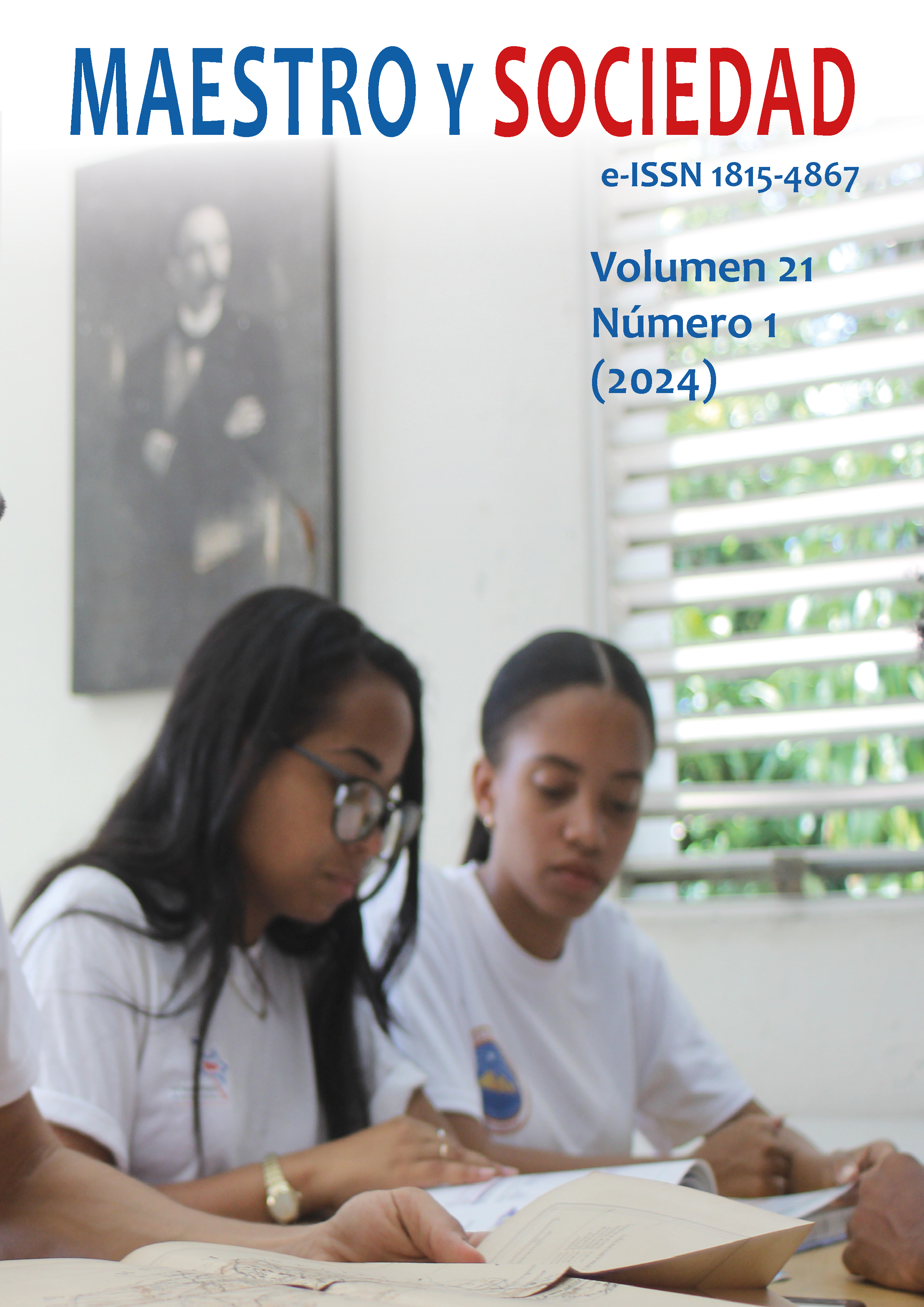La orientación familiar: una alternativa para la atención a escolares con alteraciones del comportamiento
Palavras-chave:
alteraciones del comportamiento, escuela primaria y orientación familiarResumo
Introducción: La orientación familiar es un proceso continuo, gradual y progresivo en el establecimiento de determinadas relaciones hogar-escuela que transcurre a lo largo del ciclo de vida de las personas, desde las primeras edades. En Cuba este proceso se realiza de manera adecuada dando salida a la atención de las alteraciones del comportamiento desde que nuestros educandos se insertan a las instituciones; sin embargo, no se logra en la escuela primaria el nivel deseado, considerándose insuficiencias en las familias de estos para prevenir las alteraciones del comportamiento en la Escuela Primaria "Juan Bautista Jiménez Torres". Materiales y métodos: En la investigación se emplearon métodos teóricos, empíricos y estadísticos. Los resultadosofrecidos se evidencian en un sistema de acciones para el proceso de orientación familiar como alternativa de atención a educandos con alteraciones del comportamiento. Resultado: Las acciones de orientación familiar que se proponen contribuyen al perfeccionamiento de este proceso en la Educación Primaria, desde un enfoque más amplio, con una visión, un modelo coherente, unificador e integrador que evidencie decisiones en el presente y en el futuro de las nuevas generaciones. Discusión: La orientación familiar es el proceso de comunicación donde se establecen determinadas relaciones hogar-escuela que posibilitan diagnosticar la problemática de la familia y atenderla sobre bases objetivas y las particularidades concretas de ellas, en un proceso continuo que tiene como fin su preparación para la realización eficiente de su labor educativa-formativa. Conclusiones:El sistema de acciones propició gradualmente la orientación de las familias para enfrentar con éxito la educación de sus hijos, asegurando el desarrollo de habilidades en la conducción acertada de los modelos de actuación en cuanto a atenuar el nivel de deterioro como un comportamiento desfavorable para el desarrollo de la personalidad.
Referências
American Psychiatric Association: Diagnostic and Statiscal. (1968). Manual of Mental Disorders, DSM-II.WhashingtonDC.
Angulo-Gallo, L., Leyva Granda, D. Ma., Pérez Borroto, S. y González Arias, S. (2021). Caracterización de la comprensión emocional en escolares cubanos con manifestaciones agresivas. European Journal of Child Development, Education and Psychopathology, 9(1), 1-16.
Aranda Cintra, B. L. (2018). La comunicación asertiva entre docentes y grupos de familias: vías para favorecer la relación hogar-escuela. Revista IPLAC, (6).
Aranda Cintra, B. L. (2019). Orientación Educativa: una alternativa para el desarrollo de la dinámica grupal en el establecimiento de los proyectos educativos. Revista IPLAC, (5).
Aranda Cintra, B. L., Heredia Vega, M. y Palú Sánchez, A. (2023). La orientación a las manifestaciones de adolescentes y jóvenes de comunidades rurales serranas en tiempos de COVID-19. Maestro y Sociedad, 20(4), 967-975. https://maestroysociedad.uo.edu.cu
Arés, P. (2020). Familia actual: realidades y desafíos para su evolución e intervención. Ed. Pueblo y Educación.
Constitución de la República de Cuba. (2019). Editorial Consejo de Estados.
Engels, F. y Marx, C. (2012). El origen de la Familia, la Propiedad privada y el Estado. Editorial Progreso.
Gaceta Oficial de la República de Cuba. (2022). Ministerio de Justicia. Asamblea Nacional del Poder Popular.Código de las Familias. https://www.minjus.gob.cu/sites/default/files/archivos/publicacion/2022-09/goc-2022
Gaceta Oficial de la República de Cuba. (2018). Código de la Niñez y la Juventud. Ley No. 16. Asamblea Nacional del Poder Popular.
Paz Domínguez, I. M., Aranda Cintra, B. L. yGámez Rodríguez, E. (2018).Contribuciones teórico prácticas sobre la orientación educativa en la labor pedagógica. https://dialnet.unirioja.es/servlet/libro?codigo=743196
Peña Ramírez, Y. Castro Miranda, G. y Rodríguez Pérez, D. B. (2020). La orientación educativa en la formación del profesional de pedagogía-psicología. Didáctica Y Educación, 11(6), 205–215. https://revistas.ult.edu.cu/index.php/didascalia/article/view/1113
Romero Guerra, E. (2018). La orientación familiar para potenciar el estudio individual en los educandos primarios.Revista Didasc@alia.
Rosental, M. M. e Iudin, P. F. (1968). Diccionario filosófico. https://www.iberlibro.com/buscar-libro/autor/m-m-rosental-p-f-iudin
Ruiz, J. y Gómez-Becerra, J. (2021). La orientación educativa y familiar en el ámbito escolar. Cultura, Educación y Sociedad, 12(1) ,187-200. DOI: http://dx.doi.org/10.17981/cultedusoc.
Salazar, M. (2019). La orientación familiar y su relación con el comportamiento escolar de los niños. Pol. Con. 7(11). https://www.redalyc.org/pdf/132/13231362005
Soares da Costa, M. (2019). La superación profesional de los profesores de la enseñanza primaria para la orientación familiar. [Tesis de Maestría. Universidad de Oriente].
Publicado
Como Citar
Edição
Seção
Licença
Copyright (c) 2024 Yuliensi Matos Sotomayor, Odalys Piña Batista

Este trabalho está licenciado sob uma licença Creative Commons Attribution-NonCommercial-NoDerivatives 4.0 International License.
Esta revista proporciona un acceso abierto inmediato a su contenido, basado en el principio de que ofrecer al público un acceso libre a las investigaciones ayuda a un mayor intercambio global de conocimiento. Cada autor es responsable del contenido de cada uno de sus artículos. Los artículos pueden ser inéditos o estar disponibles previamente en servidores de preprints reconocidos por la revista. Sin embargo, no se permite la duplicación de la publicación o traducción de un artículo ya publicado en otra revista o como capítulo de un libro.
This journal provides immediate open access to its content, based on the principle that providing the public with free access to research supports a greater global exchange of knowledge. Each author is responsible for the content of each of their articles. Articles may be previously unpublished or available on preprint servers recognized by the journal. However, duplication of publication or translation of an article already published in another journal or as a book chapter is not permitted.
Esta revista oferece acesso aberto imediato ao seu conteúdo, com base no princípio de que oferecer ao público acesso gratuito à pesquisa contribui para um maior intercâmbio global de conhecimento. Cada autor é responsável pelo conteúdo de cada um de seus artigos. Os artigos poderão ser inéditos ou estar previamente disponíveis em servidores de preprints reconhecidos pela revista. No entanto, não é permitida a duplicação de publicação ou tradução de artigo já publicado em outro periódico ou como capítulo de livro.



























 Universidad de Oriente
Universidad de Oriente 